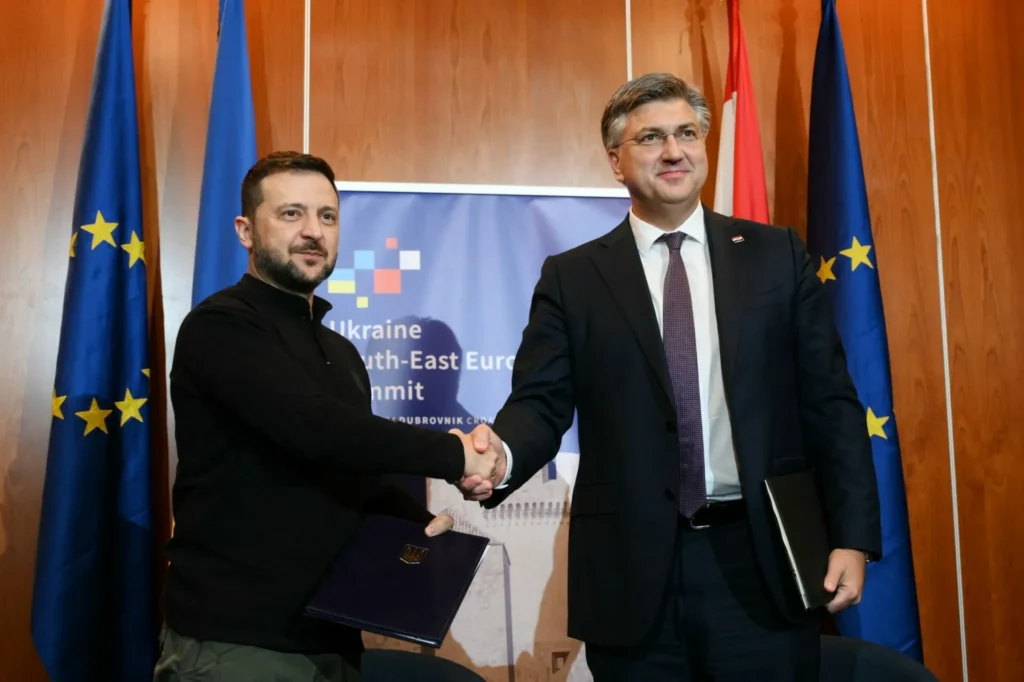At a time when rumours are spreading that Slovenia intends to cut off further military aid to Ukraine, the opposite is happening in Croatia. The so-called “Dubrovnik Declaration” was launched in Dubrovnik, in which the leaders of the countries of South-Eastern Europe expressed their full support for an independent, sovereign and territorially integrated Ukraine, as well as condemned Russia’s unprovoked aggression against its neighbour.
“Almost a thousand days have passed since the start of Russia’s full-scale military invasion of Ukraine. We condemn this unprovoked, unjustified and illegal Russian war of aggression against Ukraine. Russia’s war of aggression is a crime against the Ukrainian people; a flagrant violation of international law, including the United Nations Charter; and a grave threat to the peace, security and stability of south-eastern Europe, the entire European continent and the world as a whole,” the document reads.
“The Dubrovnik Declaration sums up the strong political will of the countries of this part of Europe, each of which in its own way has been strongly supporting Ukraine over the last two and a half years. We will continue to do so. We also support the efforts contained in President Volodymyr Zelenskyy‘s peace formula,” said Croatian Prime Minister Andrej Plenković at the signing of the declaration, who also spoke about the Ukrainian President’s peace plan.
The US Ambassador in Zagreb, Nathalie Reyes, also commented on the signing of the declaration. “The Dubrovnik Declaration on Ukraine represents another moment of strong Croatian leadership in the region. I am pleased to see a comprehensive bilateral agreement with Ukraine that reinforces Croatia’s commitment to Ukraine’s victory,” she wrote on the social network X.
Among the signatories of the Dubrovnik Declaration are Croatian Prime Minister Andrej Plenković, Ukrainian President Volodymyr Zelenskyy, Slovenian President Nataša Pirc Musar, Serbian President Aleksandar Vučić, and a number of other politicians from the South-East European region, as well as Turkish Foreign Minister Hakan Fidan.
The Croatian Prime Minister also signed a bilateral agreement with President Zelenskyy on long-term cooperation between the two countries, with key aspects of Croatian support to Ukraine, according to reports from international media. Plenković further explained that “Croatia is transferring to Ukraine its unique experience in the field of humanitarian demining, war crimes processing and care for war veterans, as well as its experience from the accession process to the European Union.”
Kajzer: Slovenia is cutting off aid to Ukraine
At the same time as Croatia, together with the leaders of South-Eastern Europe, is consolidating its political support for the attacked Ukraine, the opposite process seems to be taking place in Slovenia. A few days ago, the far-left Left party (Levica) proposed to its own government that aid to the embattled Ukraine should be cut off.
We have already written in the past about the strategic naivety or subversiveness of such calls. Calls to cut off military aid to Ukraine are actually calls for its surrender or, at best, calls for the invaded country to give up a significant part of its territory in return for peace. Masquerading such appeals as peace initiatives is, therefore, strategically naive or even subversive.
In recent days, we have been reading in several media outlets that the initiative also has support in the remaining coalition parties and that pro-Western advisers are losing influence in Robert Golob‘s circle. After the exchange of the two Russian spies who were captured in Ljubljana, a channel for so-called “quiet diplomacy” has supposedly been maintained between Ljubljana and Moscow. The content of the talks between the two countries is not yet known.
“While Slovenia is withdrawing military aid for the defence of Ukraine, our neighbours Croatians have concluded a successful conference, mainly aimed at agreements on the reconstruction of Ukraine. Interlocutors are asking what is behind the departure from the previous policy, where Slovenia has been one of the most proactive countries in the European Union since the start of the aggression against Ukraine”, wondered Tone Kajzer, former ambassador in Washington.
Ž. K.


